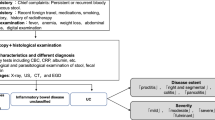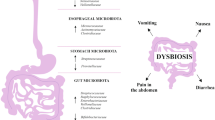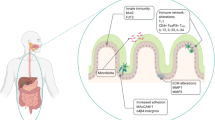Abstract
Background
Loss of response (LOR) to infliximab (IFX) has become an important clinical issue for patients with Crohn’s disease (CD). Elemental diet (ED) therapy has been established as a nutrition therapy for CD in Japan. ED therapy can reduce antigen exposure and is both efficacious and safe.
Aim
To evaluate the efficacy of concomitant ED therapy in maintaining regular IFX infusion in patients with CD.
Methods
We retrospectively studied 125 patients with luminal CD treated with scheduled IFX maintenance therapy with a regular dosage. Patients were classified into two groups: the ED group with intake ≥900 kcal/day and the non-ED group with intake <900 kcal/day. When clinical LOR was detected on the basis of disease activity, laboratory parameters, or endoscopic findings, the physician discontinued the infusion schedule of IFX. We investigated the efficacy of ED therapy for sustaining the scheduled IFX maintenance therapy.
Results
With the exception of ED intake, no significant differences were found in patient characteristics between the ED group and the non-ED group. The ED group was significantly superior to the non-ED group (p = 0.049) in sustaining scheduled IFX maintenance therapy. It is well known that ED therapy is more effective for small bowel lesions than colonic lesions in CD. When comparing ileitis and ileocolitis patients with CD, the ED group was significantly superior to the non-ED group (p = 0.015).
Conclusions
Concomitant ED therapy is effective in maintaining scheduled IFX maintenance therapy in patients with luminal CD in order to prevent LOR.




Similar content being viewed by others
References
Targan SR, Hanauer SB, van Deventer SJ, et al. A short-term study of chimeric monoclonal antibody cA2 to tumor necrosis factor alpha for Crohn’s disease. N Engl J Med. 1997;337:1029–1035.
Hanauer SB, Fegan BG, Lichtenstein GR, et al. Maintenance infliximab for Crohn’s diseasee: the ACCENT I randomized trial. Lancet. 2002;359:1541–1549.
Bhatia JK, Korelitz BI, Panagopoulos G, et al. A prospective open-label trial of Remicade in patients with severe exacerbation of Crohn’s disease requiring hospitalization: a comparison with outcomes previously observed in patients receiving intravenous hydrocortisone. J Clin Gastroenterol. 2007;41:677–681.
Schnitzler F, Fidder H, Ferrante M, et al. Mucosal healing predicts long-term outcome of maintenance therapy with infliximab in CD. Inflamm Bowel Dis. 2009;15:1295–1301.
Colombel JF, Sandborn WJ, Rutgeerts P, et al. Adalimumab for maintenance of clinical response and remission in patients with Crohn’s disease: the CHARM trial. Gastroenterology. 2007;132:52–65.
Colombel JF, Sandborn WJ, Reinisch W, et al. Infliximab, azathioprine, or combination therapy for Crohn’s disease. N Engl J Med. 2010;15:1383–1395.
Mackey AC, Green L, Leptak C. Hepatosplenic T cell lymphoma associated with infliximab use in young patients treated for inflammatory bowel disease: update. J Pediatr Gastroenterol Nutr. 2009;48:386–388.
Takagi S, Utsunomiya K, Kuriyama S, et al. Effectiveness of an ‘half elemental diet’ as maintenance therapy for Crohn’s disease: a randomized-controlled trial. Aliment Pharmacol Ther. 2006;24:1333–1400.
Tanaka T, Takahama K, Kimura T, et al. Effect of concurrent elemental diet on infliximab treatment for Crohn’s disease. J Gastroenterol Hepatol. 2006;21:1143–1149.
Hirai F, Ishihara H, Yada S, et al. Effectiveness of concomitant enteral nutrition therapy and infliximab for maintenance treatment of Crohn’s disease in adults. Dig Dis Sci. 2013;58:1329–1334.
Satsangi J, Silverberg MS, Vermeire S. The Montreal classification of inflammatory bowel disease: controversies, consensus, and implications. Gut. 2006;55:749–753.
Matsueda K, Shoda R, Takazoe M, et al. Therapeutic efficacy of cyclic home elemental enteral alimentation in Crohn’s disease: Japanese Cooperative Crohn’s Disease Study. J Gastroenterol. 1995;30:91–94.
Hirakawa H, Fukuda Y, Tanida N, et al. Home elemental enteral hyperalimentation (HEEH) for maintenance of remission in patients with Crohn’s disease. Gastroenterol Jpn. 1993;28:379–384.
Wilschanski M, Sherman P, Pencharz P, et al. Supplementary enteral nutrition maintains remission in paediatric Crohn’s disease. Gut. 1996;38:543–548.
Gisbert JP, Panes J. Loss of response and requirement of infliximab dose intensification in Crohn’s disease: a review. Am J Gastroenterol. 2009;104:760–767.
Maser EA, Villela R, Silverberg MS, et al. Association of trough serum infliximab to clinical outcome after scheduled maintenance treatment for Crohn’s disease. Clin Gastroenterol Hepatol.. 2006;4:1248–1254.
Nanda KS, Cheifetz AS, Moss AC. Impact of antibodies to infliximab on clinical outcomes and serum infliximab levels in patients with inflammatory bowel disease (IBD): a meta-analysis. Am J Gastroenterol. 2013;108:40–47.
Vande Casteele N, Gils A, Singh S, et al. Antibody response to infliximab and its impact on pharmacokinetics can be transient. Am J Gastroenterol. 2013;108:962–971.
D’Haens GR, Panaccione R, Higgins PD, et al. The London position statement of the world congress of gastroenterology on biological therapy for IBD with the European Crohn’s and colitis organization: when to start, when to stop, which drug to choose, and hot to predict response? Am J Gastroenterol. 2011;106:199–212.
Verma S, Kirkwood B, Brown S, et al. Oral nutritional supplementation is effective in the maintenance of remission in Crohn’s disease. Dig Liver Dis. 2000;32:769–774.
Lochs H. Enteral nutrition—the new maintenance therapy in Crohn’s disease? Inflamm Bowel Dis. 2007;13:1581–1582.
Conflict of interest
None.
Author information
Authors and Affiliations
Corresponding author
Rights and permissions
About this article
Cite this article
Kamata, N., Oshitani, N., Watanabe, K. et al. Efficacy of Concomitant Elemental Diet Therapy in Scheduled Infliximab Therapy in Patients with Crohn’s Disease to Prevent Loss of Response. Dig Dis Sci 60, 1382–1388 (2015). https://doi.org/10.1007/s10620-014-3493-8
Received:
Accepted:
Published:
Issue Date:
DOI: https://doi.org/10.1007/s10620-014-3493-8




